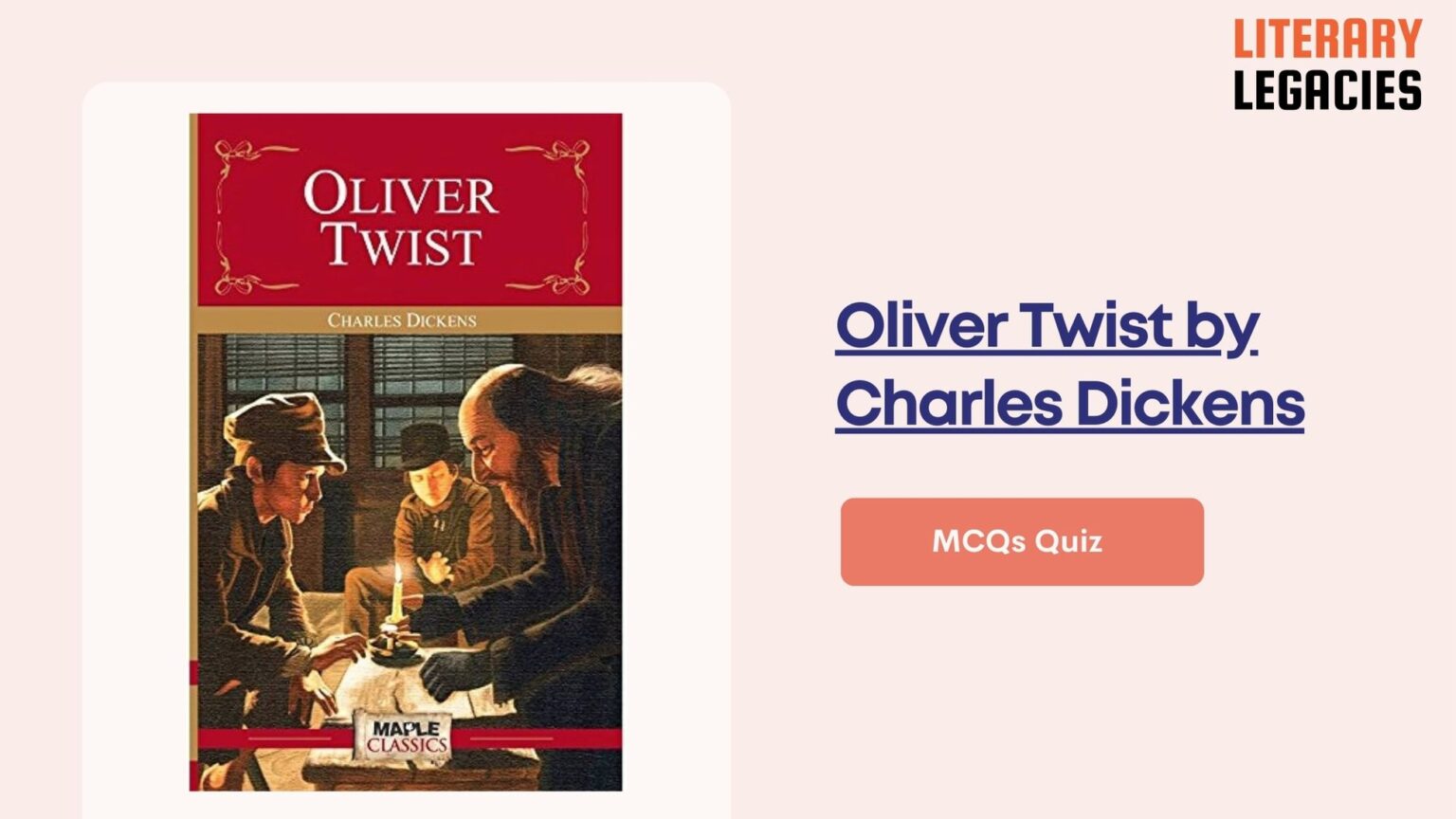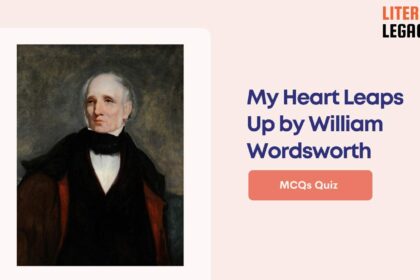1. Where was Oliver Twist born?
A. A workhouse in 1830s England
B. A home for young orphans
C. A local undertaker’s house
D. A brutish chimney sweep’s shop
Answer: A workhouse in 1830s England (A)
Oliver’s birth and early life are crucial to understanding his character.
2. What leads to Oliver’s transfer from the home for young orphans to the workhouse for adults?
A. He gets into a fight with the other boys
B. He is adopted by a local family
C. He reaches the age of nine
D. He asks for more gruel
Answer: He reaches the age of nine (C)
Oliver’s life in the workhouse is marked by hardships and struggles.
3. Who offers five pounds to take Oliver away from the workhouse?
A. Fagin, the career criminal
B. Noah Claypole, the undertaker’s apprentice
C. Mr. Sowerberry, the local undertaker
D. Mr. Bumble, the parish beadle
Answer: Mr. Bumble, the parish beadle (D)
Mr. Bumble plays a significant role in Oliver’s early life.
4. Why does Oliver attack Noah Claypole?
A. Noah makes disparaging comments about Oliver’s mother
B. Noah tries to bully him
C. Noah steals his food
D. Noah teases him about his appearance
Answer: Noah makes disparaging comments about Oliver’s mother (A)
Oliver’s loyalty to his mother is a key aspect of his character.
5. Where does Oliver meet Jack Dawkins?
A. In Mr. Sowerberry’s undertaker shop
B. In Fagin’s house
C. In a workhouse in London
D. Outside London, while traveling
Answer: Outside London, while traveling (D)
Oliver’s journey to London is a turning point in his life.
6. What does Fagin train the orphan boys to do?
A. To work as undertakers
B. To become chimney sweeps
C. To pick pockets
D. To beg on the streets
Answer: To pick pockets (C)
Fagin’s occupation is a significant aspect of the novel’s themes.
7. What happens to Oliver when he is caught by the authorities after the pickpocketing mission?
A. He is sent back to the workhouse
B. He is sentenced to prison
C. He is forced to join the army
D. He narrowly escapes being convicted of the theft
Answer: He narrowly escapes being convicted of the theft (D)
Oliver’s experiences with the law are significant in the novel.
8. Who takes the feverish Oliver to his home and nurses him back to health?
A. Fagin, the career criminal
B. Jack Dawkins, the boy who befriended Oliver
C. Mr. Sowerberry, the local undertaker
D. Mr. Brownlow, the man whose handkerchief was stolen
Answer: Mr. Brownlow, the man whose handkerchief was stolen (D)
Mr. Brownlow’s kindness is a significant turning point in Oliver’s life.
9. What is the item that the two boys steal from the elderly gentleman during the pickpocketing mission?
A. A handkerchief
B. A pocket watch
C. A wallet
D. A ring
Answer: A handkerchief (A)
The theft of the handkerchief is a significant event in the novel.
10. What is the occupation of Mr. Sowerberry, the man who apprentices Oliver?
A. A brutish chimney sweep
B. A career criminal
C. A local shopkeeper
D. A local undertaker
Answer: A local undertaker (D)
Mr. Sowerberry’s occupation is significant in understanding Oliver’s experiences.
11. What does Brownlow notice about Oliver?
A. Oliver’s resemblance to a portrait of a young woman
B. Oliver’s exceptional cooking skills
C. Oliver’s exceptional athletic abilities
D. Oliver’s talent for singing
Answer: Oliver’s resemblance to a portrait of a young woman (A)
Brownlow is struck by Oliver’s resemblance to a portrait of a young woman that hangs in his house.
12. Where does Oliver spend an idyllic summer?
A. In a boarding school
B. In a hospital
C. In the countryside with Mrs. Maylie and her niece Rose
D. In London with Fagin’s gang
Answer: In the countryside with Mrs. Maylie and her niece Rose (C)
Oliver spends an idyllic summer with Mrs. Maylie and her niece Rose in the countryside.
13. What does Monks obtain and destroy?
A. A letter from Oliver’s mother
B. A painting of Oliver’s father
C. A diary belonging to Fagin
D. A gold locket left by Oliver’s mother
Answer: A gold locket left by Oliver’s mother (D)
Monks obtains and destroys the gold locket left by Oliver’s mother when she died.
14. What is the reason behind Monks’ pursuit of Oliver?
A. Because Monks is jealous of Oliver’s good fortune
B. Because Monks wants to befriend Oliver
C. Because Monks wants to ensure Oliver is deprived of his share of the family inheritance
D. Because Monks wants to take revenge on Oliver
Answer: Because Monks wants to ensure Oliver is deprived of his share of the family inheritance (C)
Monks has been pursuing Oliver all along in the hopes of ensuring that his half-brother is deprived of his share of the family inheritance.
15. What is the relationship between Rose and Oliver?
A. Rose is Oliver’s aunt
B. Rose is Oliver’s friend
C. Rose is Oliver’s sister
D. Rose is Oliver’s cousin
Answer: Rose is Oliver’s aunt (A)
It is discovered that Rose is Agnes’s younger sister, hence Oliver’s aunt.
16. What happens to Fagin at the end of the story?
A. Fagin becomes a good person
B. Fagin is imprisoned for his crimes
C. Fagin escapes to a distant land
D. Fagin is hung for his crimes
Answer: Fagin is hung for his crimes (D)
Fagin is hung for his crimes.
17. Who adopts Oliver at the end of the story?
A. Monks
B. Mrs. Maylie
C. Rose
D. Mr. Brownlow
Answer: Mr. Brownlow (D)
Mr. Brownlow adopts Oliver.
18. What happens to Sikes?
A. Sikes hangs himself inadvertently while trying to escape
B. Sikes becomes a reformed character
C. Sikes is imprisoned for murder
D. Sikes is forgiven by Nancy’s ghost
Answer: Sikes hangs himself inadvertently while trying to escape (A)
Sikes brutally murders Nancy and flees London, but inadvertently hangs himself while trying to escape.
19. What does Nancy do secretly?
A. Nancy secretly plots against Fagin
B. Nancy secretly marries Sikes
C. Nancy secretly helps Oliver escape
D. Nancy secretly meets with Rose to inform her of Fagin’s designs
Answer: Nancy secretly meets with Rose to inform her of Fagin’s designs (D)
Nancy meets secretly with Rose and informs her of Fagin’s designs.
20. Who brings Oliver to Fagin’s gang?
A. Sikes and Nancy
B. Bill Sikes and his lover Nancy
C. Fagin and Monks
D. Mr. Brownlow and Rose
Answer: Bill Sikes and his lover Nancy (B)
Bill Sikes and his lover Nancy capture Oliver and return him to Fagin.
21. What was the primary goal of the government workhouses under the Poor Law of 1834?
A. To provide a comfortable living environment for the poor
B. To punish the poor for their laziness
C. To provide education and job training for the poor
D. To inspire the poor to better their circumstances through harsh conditions
Answer: To inspire the poor to better their circumstances through harsh conditions (D)
The Poor Law of 1834 was based on the principle that poverty was a consequence of laziness.
22. What was the consequence of the economic dislocation of the Industrial Revolution on the poor?
A. It increased the rations of food and clothing in workhouses
B. It led to a decrease in the number of workhouses
C. It made it impossible for many to improve their circumstances
D. It provided new job opportunities for the poor
Answer: It made it impossible for many to improve their circumstances (C)
The Industrial Revolution made it difficult for many to improve their economic situation.
23. What was the attitude of the charitable workers like Mr. Bumble and Mrs. Mann towards the poor?
A. They were inefficient but well-intentioned
B. They were greedy, lazy, and arrogant
C. They were selfless and dedicated to helping the poor
D. They were strict but fair
Answer: They were greedy, lazy, and arrogant (B)
Dickens portrays the charitable workers as greedy, lazy, and arrogant.
24. What was the effect of the workhouses on the poor?
A. They inspired the poor to work harder and improve their circumstances
B. They separated families and provided meager rations
C. They reproduced the awful conditions in which the poor lived anyway
D. They provided a means for social and economic betterment
Answer: They reproduced the awful conditions in which the poor lived anyway (C)
The workhouses did not provide a means for the poor to improve their situation.
25. What was the purpose of the labor required in the workhouses?
A. To generate income for the workhouse officials
B. To punish the poor for their laziness
C. To provide a sense of purpose for the residents
D. To inspire the poor to better their circumstances
Answer: To inspire the poor to better their circumstances (D)
The labor required in the workhouses was meant to inspire the poor to improve their circumstances.
26. What was the consequence of the Poor Law of 1834 for families in the workhouses?
A. They were provided with education and job training
B. They were able to stay together and receive support
C. They were given a choice between different workhouses
D. They were separated and received meager rations
Answer: They were separated and received meager rations (D)
Families were often separated in the workhouses, and rations were meager.
27. What was the attitude of the government towards the poor during Dickens’ time?
A. They believed poverty was a result of circumstances beyond one’s control
B. They believed poverty was a consequence of laziness
C. They believed poverty was a result of a lack of education
D. They believed poverty was a result of a lack of job opportunities
Answer: They believed poverty was a consequence of laziness (B)
The government during Dickens’ time believed that poverty was a consequence of laziness.
28. What was the main criticism of the charitable institutions in Dickens’ time?
A. They were inefficient but well-intentioned
B. They were strict but fair
C. They reproduced the awful conditions in which the poor lived anyway
D. They were corrupt and only helped the wealthy
Answer: They reproduced the awful conditions in which the poor lived anyway (C)
Dickens criticizes charitable institutions for reproducing the awful conditions in which the poor lived.
29. What was the role of the officials who ran the workhouses?
A. They were absentee landlords with little involvement in the workhouses
B. They were responsible for the day-to-day operations of the workhouses
C. They were greedy and corrupt, violating the values they preached
D. They were advocates for the poor and worked to improve their circumstances
Answer: They were greedy and corrupt, violating the values they preached (C)
Dickens portrays the officials who ran the workhouses as greedy, lazy, and arrogant.
30. What was the main challenge faced by the poor in the workhouses?
A. They were not provided with a comfortable living environment
B. They were not provided with education and job training
C. They were not given a choice between different workhouses
D. They were not able to improve their circumstances due to the economic dislocation
Answer: They were not able to improve their circumstances due to the economic dislocation (D)
The economic dislocation of the Industrial Revolution made it difficult for the poor to improve their circumstances.
31. What is the primary focus of individualism in the Victorian era, according to Fagin?
A. To promote social welfare and collective good
B. To promote social equality and justice
C. To prioritize personal interests and self-gain
D. To reform the economic system
Answer: To prioritize personal interests and self-gain (C)
Fagin’s philosophy emphasizes the importance of individual self-interest in achieving social stability.
32. What is the contrast between Fagin’s family and the group formed by Oliver and his friends?
A. One is a wealthy family, while the other is a poor family
B. One is based on business relationships, while the other is based on personal relationships
C. One is a nuclear family, while the other is an extended family
D. One values selflessness, while the other is built on self-interest
Answer: One values selflessness, while the other is built on self-interest (D)
The two groups demonstrate the importance of selfless devotion in forming strong bonds and achieving happiness.
33. What is the impact of the urban environment on the characters in the novel, according to Dickens?
A. It has a corrupting influence on their moral sensibilities
B. It has a positive effect on their moral sensibilities
C. It has no effect on their moral sensibilities
D. It has a neutral effect on their moral sensibilities
Answer: It has a corrupting influence on their moral sensibilities (A)
Dickens suggests that the urban environment can corrupt individuals and lead to moral decay.
34. What is the significance of the countryside in Oliver Twist?
A. It represents a place of idealized rural life and purity
B. It represents a place of moral corruption and decay
C. It represents a place of industrialization and urbanization
D. It represents a place of poverty and hardship
Answer: It represents a place of idealized rural life and purity (A)
The countryside is portrayed as a place of purity and idealized rural life, contrasting with the corrupting influence of the urban environment.



